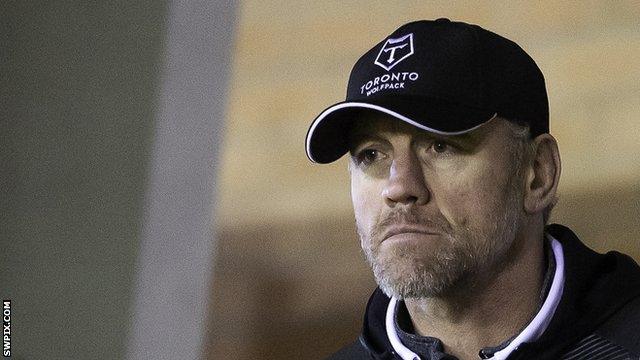Toronto Wolfpack: Super League vision achieved - what next for Canada's rugby league club?
- Published
- comments

Toronto Wolfpack beat Featherstone Rovers 24-6 to win promotion to Super League
Four years ago, when Canadian Eric Perez outlined his vision for a rugby league side in Toronto, he was written off in some quarters as a well-meaning crank.
Four years later, it is no longer a wild and whacky dream. It is reality.
The Wolfpack's win over Featherstone in this year's promotion play-off decider, earning them entry into Super League, means that in 2020 rugby league - and British sport - will have its first ever North American club playing in the top flight of the domestic league.
It has been an incredible journey, with two promotions in three years through the lower leagues. But Perez's confidence that the experiment will work, backed by an estimated £8m investment thus far from mining multi-millionaire David Argyle, has been justified.
Perez is no longer directly involved with the Wolfpack. He is now working on a similar plan to begin the same journey with another Canadian club in Ottawa. They are due to enter the lower strata of the professional leagues in 2021.
And it is generally agreed that North America does need at least two top-flight clubs to sustain the long term viability of rugby league in that part of the world.
But for the time being, it is just Toronto.
What can Super League expect from them next year?

Brian McDermott has led Toronto Wolfpack to promotion to Super League
Well, they will be competitive.
In coach Brian McDermott, they have a multiple Grand Final winner who was Leeds' most successful coach in the modern era before he left the Rhinos in 2018.
They have already built a squad, made up of mostly Super League-quality players, that ran away with the League Leaders' Shield in the Championship this year, before coming through unscathed in the play-offs. They will add some more big names to their roster.
So their fight is more likely to be one to get into Super League's top five next year, rather than merely a fight for survival.
The fixture format in 2020 is likely to see them playing in blocks of two matches at home and two matches away, to ease the burden of crossing the Atlantic on a regular basis.
Travelling to Toronto, clubs have the option of flying in on a Thursday for a Saturday game, and flying home on a Sunday. This season in the Championship, some clubs have chosen to fly in on the Friday and straight home again on the Saturday night after the match.
The long Canadian winter is unlikely to allow them to play at home in the opening couple of months of the campaign, but they are wanting to take early season 'home' games on the road.
Barcelona and Dublin have been suggested, but Newcastle and London are also likely destinations for those 'on the road' matches.
The Wolfpack will also play in the Challenge Cup next year, but each game will have to be played at the home of whoever they draw.
'An exciting, unprecedented chapter'

Toronto Wolfpack won the Championship League Leaders' Shield with a 12-point gap on second-placed Toulouse
Argyle remains the main financial backer of the club, despite sacking himself as chairman and chief executive earlier this year after he made a self-acknowledged racist remark to a Swinton player.
His long-term aim is "to get rugby balls into the hands of kids across North America" and he stayed committed to the club even when they missed out on expected promotion to Super League last year.
His money goes a long way to keeping the club afloat and prospering, but they are also aiming to become more self-sufficient in the coming years.
It has been widely reported that the Wolfpack will not take any of the central funding from the TV deal that currently finances Super League. But some of that central funding is likely to be used to subsidise clubs travelling to Toronto.
They will also want to be free to negotiate their own TV deals within the North American market and be able to keep the proceeds of any of those deals, or of any sponsorship and merchandise sales that they negotiate for themselves.
The Wolfpack do not come into Super League with universal approval. Behind the scenes, a minority of club chief executives and chairmen mutter about the uncertainty and potential extra costs to fans.
And a glance at social media shows a polarisation of opinion when it comes to rugby league fans' take on the newly promoted side.
But, on balance, this is an exciting, unprecedented chapter for rugby league.
It may prove to be the beginning of a revolution and real growth for the game in the northern hemisphere if it can fully tap into the Canadian and US market. It may just be an interesting diversion for the next couple of years that eventually fizzles out.
Whichever it proves to be, Toronto Wolfpack will add some interest and spice to the Super League scenery next year.
